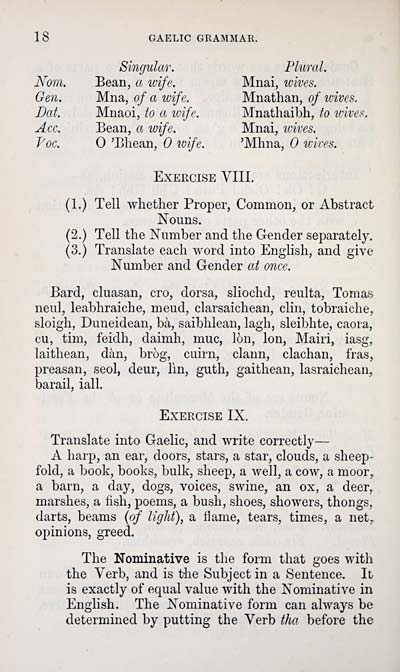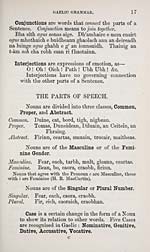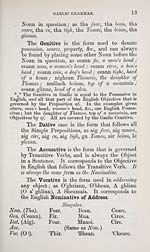Download files
Complete book:
Individual page:
Thumbnail gallery: Grid view | List view

(1.) Tell whether Proper, Common, or Abstract
Nouns.
(2.) Tell the Number and the Gender separately.
(3.) Translate each word into English, and give
Number and Gender at once.
Bard, cluasan, cro, dorsa, sliochd, reulta, Toma.s
neul, leabhraiche, meud, clarsaichean, clin, tobraiche,
sloigh, Duneidean, ba, saibhlean, lagh, sleibhte, caora,
cu, tim, feidh, daimh, muc, Ion, Ion, Mairi, iasg,
laithean, dan, brog, cuirn, clann, clachan, fras,
preasan, seol, deur, lin, guth, gaithean, lasraichean,
barail, iall.
Exercise IX.
Translate into Gaelic, and write correctly —
A harp, an ear, doors, stars, a star, clouds, a sheep-
fold, a book, books, bulk, sheep, a well, a cow, a moor^
a barn, a day, dogs, voices, swine, an ox, a deer,
marshes, a fish, poems, a bush, shoes, showers, thongs,
darts, beams {of light), a flame, tears, times, a net.
opinions, greed.
The Nominative is the form that goes with
the Verb, and is the Subject in a Sentence. It
is exactly of equal value with the Nominative in
English. The Nominative form can always be
determined by putting the Verb tha before the
Nouns.
(2.) Tell the Number and the Gender separately.
(3.) Translate each word into English, and give
Number and Gender at once.
Bard, cluasan, cro, dorsa, sliochd, reulta, Toma.s
neul, leabhraiche, meud, clarsaichean, clin, tobraiche,
sloigh, Duneidean, ba, saibhlean, lagh, sleibhte, caora,
cu, tim, feidh, daimh, muc, Ion, Ion, Mairi, iasg,
laithean, dan, brog, cuirn, clann, clachan, fras,
preasan, seol, deur, lin, guth, gaithean, lasraichean,
barail, iall.
Exercise IX.
Translate into Gaelic, and write correctly —
A harp, an ear, doors, stars, a star, clouds, a sheep-
fold, a book, books, bulk, sheep, a well, a cow, a moor^
a barn, a day, dogs, voices, swine, an ox, a deer,
marshes, a fish, poems, a bush, shoes, showers, thongs,
darts, beams {of light), a flame, tears, times, a net.
opinions, greed.
The Nominative is the form that goes with
the Verb, and is the Subject in a Sentence. It
is exactly of equal value with the Nominative in
English. The Nominative form can always be
determined by putting the Verb tha before the
Set display mode to: Large image | Transcription
Images and transcriptions on this page, including medium image downloads, may be used under the Creative Commons Attribution 4.0 International Licence unless otherwise stated. ![]()
| Early Gaelic Book Collections > Hew Morrison Collection > Gaelic texts for schools (new code) > (22) |
|---|
| Permanent URL | https://digital.nls.uk/79351276 |
|---|
| Description | A selection of items from a collection of 320 volumes and 30 pamphlets of literary and religious works in Scottish Gaelic. From the personal library of Hew Morrison, the first City Librarian of Edinburgh. |
|---|
| Description | Selected items from five 'Special and Named Printed Collections'. Includes books in Gaelic and other Celtic languages, works about the Gaels, their languages, literature, culture and history. |
|---|

